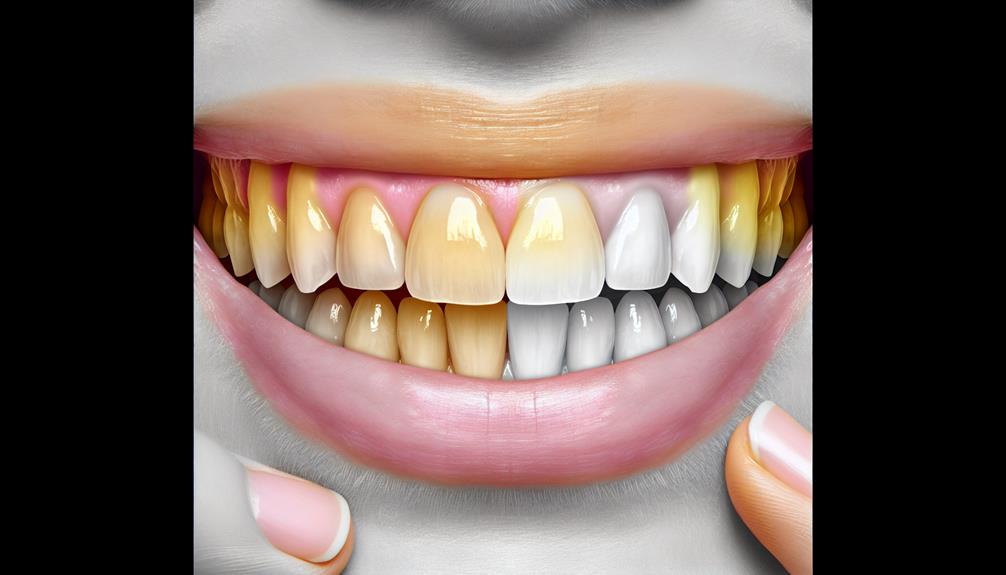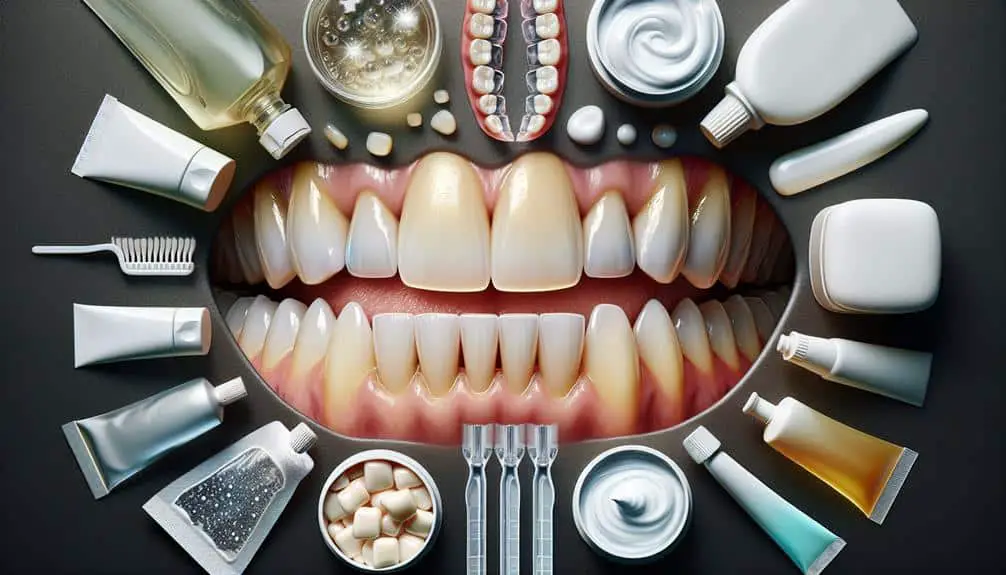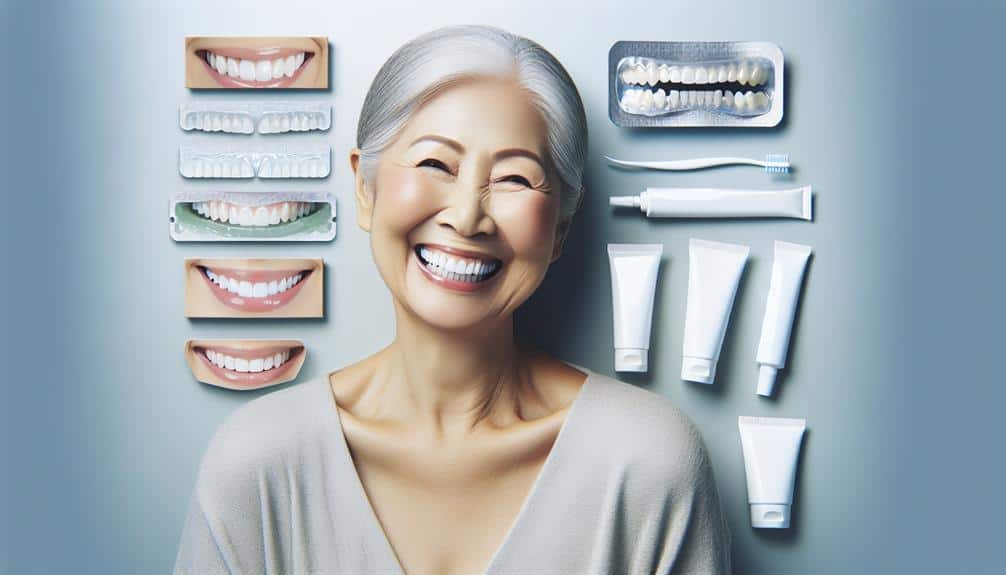As you age, your teeth whitening changes because the enamel naturally thins and yellows over time. This process makes the underlying dentin more visible, affecting the overall color of your teeth. Understanding these natural changes can help you adapt your whitening routine to maintain a brighter smile.
Key Points
- Enamel naturally thins with age, making teeth more susceptible to discoloration.
- Aging causes dentin (inner tooth layer) to darken, affecting overall tooth color.
- Reduced enamel thickness exposes more of the yellowish dentin layer.
- Aging leads to decreased mineralization of enamel, making teeth appear less white.
- Changes in dentin and enamel structure impact how teeth respond to whitening treatments.
Common Causes of Tooth Discoloration
As you age, common causes of tooth discoloration can vary from external factors like dietary habits, smoking, to internal factors such as medication side effects or genetics. Your dietary choices, rich in dark-colored foods and beverages like coffee, tea, or red wine, can contribute to staining your teeth over time.
Smoking tobacco products is another significant external factor that can lead to yellowing or browning of your teeth due to the tar and nicotine present in cigarettes.
On the other hand, certain medications such as tetracycline antibiotics, antihistamines, or high blood pressure drugs can cause intrinsic discoloration of your teeth. Additionally, genetics play a role in determining the natural color of your teeth and how prone you're to discoloration. Some people may have inherently brighter or darker teeth based on their genetic makeup.
Understanding these common causes of tooth discoloration can help you make informed decisions about your oral hygiene routine and lifestyle choices to maintain a brighter smile as you age.
Best Over-The-Counter Whitening Products
To enhance the brightness of your smile, explore the efficacy of various over-the-counter whitening products readily available in the market. When pondering over-the-counter whitening options, you have a variety of choices to assist you in achieving a whiter smile. Here are some of the best products to ponder:
- Whitening Strips: These thin, flexible strips coated with a whitening gel are easy to apply and can help lighten the color of your teeth.
- Whitening Toothpaste: Specifically formulated to remove surface stains, whitening toothpaste can be a convenient addition to your oral care routine.
- Whitening Pens: These pens allow for targeted application of whitening gel, making them ideal for touch-ups on the go.
- Whitening Mouthwash: Some whitening mouthwashes contain hydrogen peroxide or other whitening agents to help brighten your smile while freshening your breath.
- Whitening Gels: These gels, often applied with a tray, can effectively whiten teeth over time.
Before trying these over-the-counter options, it's crucial to consult with your dentist, particularly if you have sensitive teeth or existing dental conditions.
Tips for Safely Whitening Aging Teeth
Consider integrating age-appropriate whitening techniques to effectively enhance the appearance of your teeth over time.
When it comes to safely whitening aging teeth, there are important factors to take into account. Initially, making diet modifications can positively impact the color of your teeth. Avoiding foods and drinks that stain teeth, such as coffee, tea, and red wine, can help maintain a brighter smile. Additionally, consuming crunchy fruits and vegetables like apples and carrots can help naturally scrub away surface stains.
For more significant whitening results, professional options are available. Consulting with a dentist for professional teeth whitening treatments guarantees that the process is done safely and effectively. Dentists can provide customized whitening solutions tailored to your specific needs, taking into account factors like enamel health and sensitivity.
Understanding Enamel Thinning and Sensitivity
To understand how diet modifications impact the color of your teeth, it's important to explore the effects of enamel thinning and sensitivity on tooth whitening. Enamel protection is vital in maintaining the whiteness of your teeth. Here are some key points to ponder:
- Enamel, the outer layer of the teeth, safeguards against stains and discoloration. Safeguarding this layer is essential for maintaining a bright smile.
- Over time, enamel can wear down due to factors like acidic foods, aggressive brushing, or bruxism. This thinning can make teeth more prone to staining.
- Sensitivity management is pivotal when contemplating teeth whitening treatments. Sensitivity can be a side effect, especially if enamel thickness is compromised.
- Using desensitizing toothpaste or seeking professional advice can help manage sensitivity during whitening procedures.
- Enamel protection through regular dental check-ups, proper oral hygiene, and avoiding acidic foods can help maintain a healthy smile and prevent excessive discoloration.
Lifestyle Adjustments for Brighter Smiles
Improve the brightness of your smile by incorporating simple lifestyle adjustments into your daily routine. Making diet changes can greatly impact the whiteness of your teeth. Avoiding foods and beverages that stain, such as coffee, red wine, and berries, can help prevent discoloration. Opt for teeth-friendly options like apples, carrots, and broccoli, which can naturally help clean your teeth and maintain their brightness.
In addition to diet modifications, consider exploring natural remedies to whiten your teeth. Coconut oil pulling, baking soda paste, and activated charcoal are popular choices known for their teeth-whitening properties. However, it's important to use these remedies carefully and consult with your dentist to make sure they're safe for your teeth and gums.
Frequently Asked Questions
Can Aging Make Teeth More Susceptible to Staining From Certain Foods and Drinks?
As you age, the natural aging process can lead to enamel erosion, making your teeth more susceptible to staining from certain foods and drinks. Your diet plays an important role in determining your teeth's staining susceptibility.
How Does Genetics Play a Role in Teeth Discoloration as We Age?
As you age, genetic predisposition can influence teeth discoloration. The aging process naturally affects tooth enamel, making it more prone to staining from diet choices. Understanding these factors can help manage teeth whitening needs effectively.
Are There Any Natural Remedies or DIY Methods for Whitening Teeth That Are Safe for Older Individuals?
For older individuals, there are safe home remedies and DIY methods for teeth whitening. While effectiveness varies, options like baking soda paste, hydrogen peroxide rinses, and oil pulling can be tried cautiously.
Can Certain Medications Commonly Prescribed to Older Adults Cause Teeth Discoloration?
When taking medications, some prescribed to older individuals, be mindful of potential side effects on your dental hygiene. Certain drugs can cause teeth discoloration. Consult your healthcare provider for advice on managing medication effects on oral health.
Is It Possible for Teeth to Become Too Sensitive From Frequent Whitening Treatments as We Age?
As you age, teeth can become more sensitive from frequent whitening treatments. To manage sensitivity, consider whitening alternatives or over-the-counter options. Understanding aging effects on teeth is essential for maintaining oral health.
Conclusion
To sum up, as we age, our teeth naturally undergo changes that can lead to discoloration. However, with the right whitening products and techniques, we can still achieve a brighter smile.
Remember, like a diamond in the rough, your teeth may need a little polishing to shine bright again. Stay informed, take care of your oral health, and embrace your radiant smile at any age.



